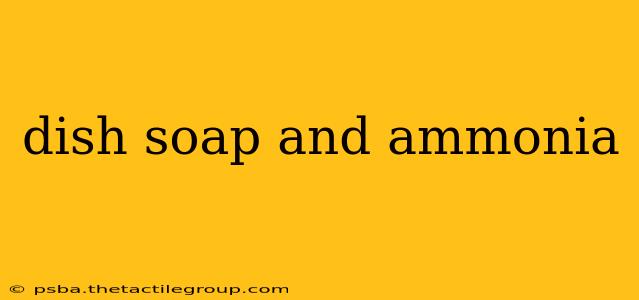Mixing household cleaners can seem like a shortcut to a sparkling clean home, but some combinations can be incredibly dangerous. One such pairing is dish soap and ammonia. This seemingly innocuous mix can create hazardous fumes and potentially life-threatening situations. This article delves into the chemical reactions, the dangers involved, and safer alternatives for cleaning your home.
The Chemistry Behind the Danger
Dish soaps are typically formulated with surfactants, which are chemicals that reduce the surface tension of water, allowing it to better penetrate and lift dirt and grease. Ammonia, on the other hand, is a strong base. While effective at dissolving grease and grime, it's also volatile and releases toxic fumes.
When combined, the surfactants in dish soap don't directly react with the ammonia. However, the problem arises from the ammonia's volatile nature. The surfactants may slightly alter how quickly ammonia evaporates, but the primary danger is still the release of ammonia gas itself.
Health Risks Associated with Ammonia Fumes
Inhaling ammonia fumes can lead to a range of health problems, depending on the concentration and duration of exposure. These can include:
- Irritation of the eyes, nose, and throat: This is the most common effect, characterized by burning sensations, coughing, and watery eyes.
- Respiratory problems: Higher concentrations can cause shortness of breath, wheezing, and even pneumonia. Individuals with pre-existing respiratory conditions are particularly vulnerable.
- Skin irritation: Direct contact with the ammonia solution can cause skin burns and rashes.
- More serious effects: In severe cases, exposure to high concentrations of ammonia can lead to lung damage, fluid buildup in the lungs (pulmonary edema), and even death.
Why You Should Never Mix Dish Soap and Ammonia
The potential dangers significantly outweigh any perceived benefits of mixing these two cleaners. There's no cleaning advantage gained by combining them; in fact, it actively increases the risk of exposure to harmful fumes. Always use each cleaner individually, following the manufacturer's instructions carefully.
Safer Cleaning Alternatives
Instead of resorting to risky combinations, consider these safer and effective cleaning methods:
- Individual Cleaning: Use dish soap for dishes and countertops, and ammonia (in well-ventilated areas) for specific cleaning tasks where its strength is necessary, like oven cleaning or tackling stubborn grease. Always follow the product instructions meticulously.
- Natural Cleaning Solutions: Explore eco-friendly alternatives such as baking soda, vinegar, and lemon juice, which are effective for a wide range of cleaning tasks and pose no significant health risks when used correctly.
- Dedicated Cleaners: Utilize specialized cleaners formulated for specific surfaces and tasks. These are often more effective and safer than homemade concoctions.
Protecting Yourself During Cleaning
Regardless of the cleaning agents you choose, prioritize safety:
- Ventilation: Always work in a well-ventilated area, preferably with windows open.
- Protective Gear: Wear gloves and eye protection to prevent direct contact with cleaning chemicals.
- Read Labels: Carefully read and follow the instructions on all cleaning product labels.
- Store Safely: Keep cleaning products out of reach of children and pets.
Mixing dish soap and ammonia is a hazardous practice with potentially serious consequences. Prioritizing safety and using appropriate cleaning methods is crucial for protecting your health and the well-being of your family. Remember, a clean home shouldn't come at the cost of your health.

